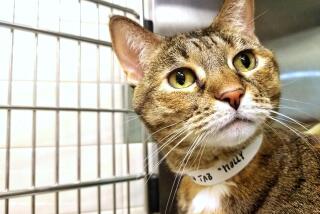Learning the Games That Pets Play : Those Animal Maneuvers Establish Who’s Really in Charge
- Share via
Your dog or cat rubs against your leg. What a wimp, you think, mindlessly reaching for his favorite food, which is precisely what he had in mind.
“The pet is, in fact, dominating through submission,” Dr. Bruce Fogle said. “You don’t have to be overtly aggressive to be dominant, and it is something that pets have learned.”
It is but one of many strategies that domesticated animals employ to get their way, as explained by the London veterinarian in a new book, “Games Pets Play: How Not to Be Manipulated by Your Pet” (Viking, $15.95).
Not Just for Fun
When Fogle refers to games, he doesn’t mean the type played perhaps with a ball, but rather to the “transactional” kind popularized in the early ‘60s by psychiatrist Eric Berne in his book, “Games People Play.”
“One of the reasons we choose dogs as pets is that there appears to be in their attachment a capacity for an altruistic love, a willingness to please another without outward reward,” Fogle writes. “But we also choose them because we are helplessly programmed to do so.”
In a recent interview, he expanded on the thought: “Humans are programmed for lifelong parenting. And pets don’t hesitate to take advantage of this need in us.
“Pet owners are that part of the population who need to care the most. But sometimes mothering becomes smothering.” He quoted E. B. White on the Pekinese: “Ladies choose’m to clutch to their bosom.”
The games take place, the author said, because of our tendency to see pet behavior in human terms--to anthropomorphize.
And shrewd are the tactics that a wily cat, dog or bird quickly learns, including parenting on his own part. “A pet dog symbolically plays the role of a parent,” the veterinarian writes. “The pet gives comfort and solace, physical contact and constancy and a loyalty unlike anything else on earth. A pet dog offers a type of dedication that, outside of infancy, we never get and never hope of getting.”
But nothing in life comes without a price. Pets of any kind, Fogle said in the interview, are great observers and great psychologists--”better, in fact, than we are.”
Thus there are Eating Games:
“Pet owners honestly believe that their animals will starve if they don’t eat what is placed before them,” Fogle said. “They overlook the fact that dogs, for instance, can gorge themselves on a large meal and then live off it several days. Eskimo dogs are usually fed only once every five days, and retain their energy.
“In my 17 years of practice, I have never heard of a dog dying of starvation when food is available. Dogs and cats win starvation games because they come across owners who let them.”
The Londoner mentioned a Yorkshire Terrier who had thusly turned his owner into a servant.
The dog would eat only grilled filet steak seasoned with salt. “But steak is the only thing he will eat,” the woman who owned him responded.
The animal, Fogle explained, had been playing “I can’t eat that,” because his owner wanted to play “he won’t eat that.”
Dogs are loyal because of the companionship we give them, but they learn to play “Feed me!” because for many of them there is nothing much else to do, according to Fogle.
A Wake-Up Ploy
He told of a cat who had learned to get his meal before dawn by dipping his paw into his water bowl, jumping onto his owner’s bed, and splashing him in the face.
The vet also told of one of his patients, a 48-year-old, blind African gray parrot. When his owner comes home from work, the bird screeches “Hello,” immediately followed by “Feed me.”
Obsessive feeders, the author continued, feed their pets excessively, in part because of the signals they receive. “Cats use body language. They head-butt and writhe around your legs. Dogs paw you or, if they are small enough, lick or try to get on your lap. My African gray parrot, Humphrette . . . bends her head for a tickle whenever I am near her, and once she feels my fingers, presses into them with all of her body.”
As for Social Games, “Pets soon learn how to handle their owners,” Fogle said. “Dogs beg and crawl, make physical contact, whine and act helpless.”
The Real Message
Pet owners who say “My dog can’t live without me” are really saying “I can’t live without my dog,” the vet concluded.
Guilt even enters into what may or may not always be games. Cat owners, Fogle said, say that their cats scratch furniture to gain attention. “They don’t. They almost always do it to groom their claws, but lots of owners feel guilty about not spending enough time with their cats, or leaving them at home alone during the day, and they persist in thinking that their cats are ‘getting back at them.’ ”
If a game is being played, the owner can at least play to a tie: “There is no room for democracy in an owner-pet relationship,” said Fogle, himself the owner of several. “You have to be a benign dictator. You are the boss.”
Not Good for Birds
On the subject of social needs, Fogle said that while humans are good cat and dog substitutes for cats and dogs--we play with them, we are their leaders, we stroke them--we are poor substitutes for birds:
“Parrots, for instance, are really gregarious. They need a lot of attention. That is why they parrot and learn to talk--they want to be social.
“That is why, if you go to work and leave a parrot alone, it will sometimes react by pulling out its feathers.”
Other games:
- The Ritual and Gift Games. “Dogs especially like rituals because they use them to maintain their places in the social order. By so doing, they get stroked and get social recognition.”
And social recognition also is the reason for gift rituals, the vet said. “Cats will carry out their gift rituals in a more natural manner--more natural in that given the opportunity, their gifts will be mice, birds and birds’ eggs.”
While cats, by their nature, may not have as many greeting rituals as dogs do, Fogle mentioned one London feline who, when the phone rings, knocks the receiver onto the floor and purrs into it.
- Jealousy Games, or Pay Attention to Me . In his book, the author wrote that “65% of pet owners have reported that their pets try to muzzle in when family members are affectionate to each other.”
- Bedroom Games: Pet: “It’s my bed too!” Owner: “He’ll be so lonely if I leave him that I won’t be able to sleep.”
Fogle said he did a survey on his TV show that produced the findings that 68% of cat owners and 44% of dog owners permit their animals to sleep on the bed at night.
- Dominance Games. The owner is saying “Just remember, Rex, I’m the Boss,” while the pet’s version is “Simon Says.”
“Car or bike chasing,” the author went on, “is a classic example of ‘Simon Says.’ A couple of barks, the vehicle disappears, and the animal believes it has been scared away. The game has been won.”
Even psychosomatic games are in the repertoire of a domesticated animal. “A dog might feign a limp from an old injury in order to get attention.”
All of this notwithstanding, it is unlikely that pet gamesmanship will to any extent disappear, if for no other reason than human narcissism.
There is more than a little truth to the belief that pets often look like their owners. “Most of the time we choose pets that complement our personalities, or at least the image that we have of ourselves,” the veterinarian concluded. “In that sense, a pet is really an extension of its owner.”
And does anyone for a moment doubt that the animal realizes this?
More to Read
Sign up for our Book Club newsletter
Get the latest news, events and more from the Los Angeles Times Book Club, and help us get L.A. reading and talking.
You may occasionally receive promotional content from the Los Angeles Times.






